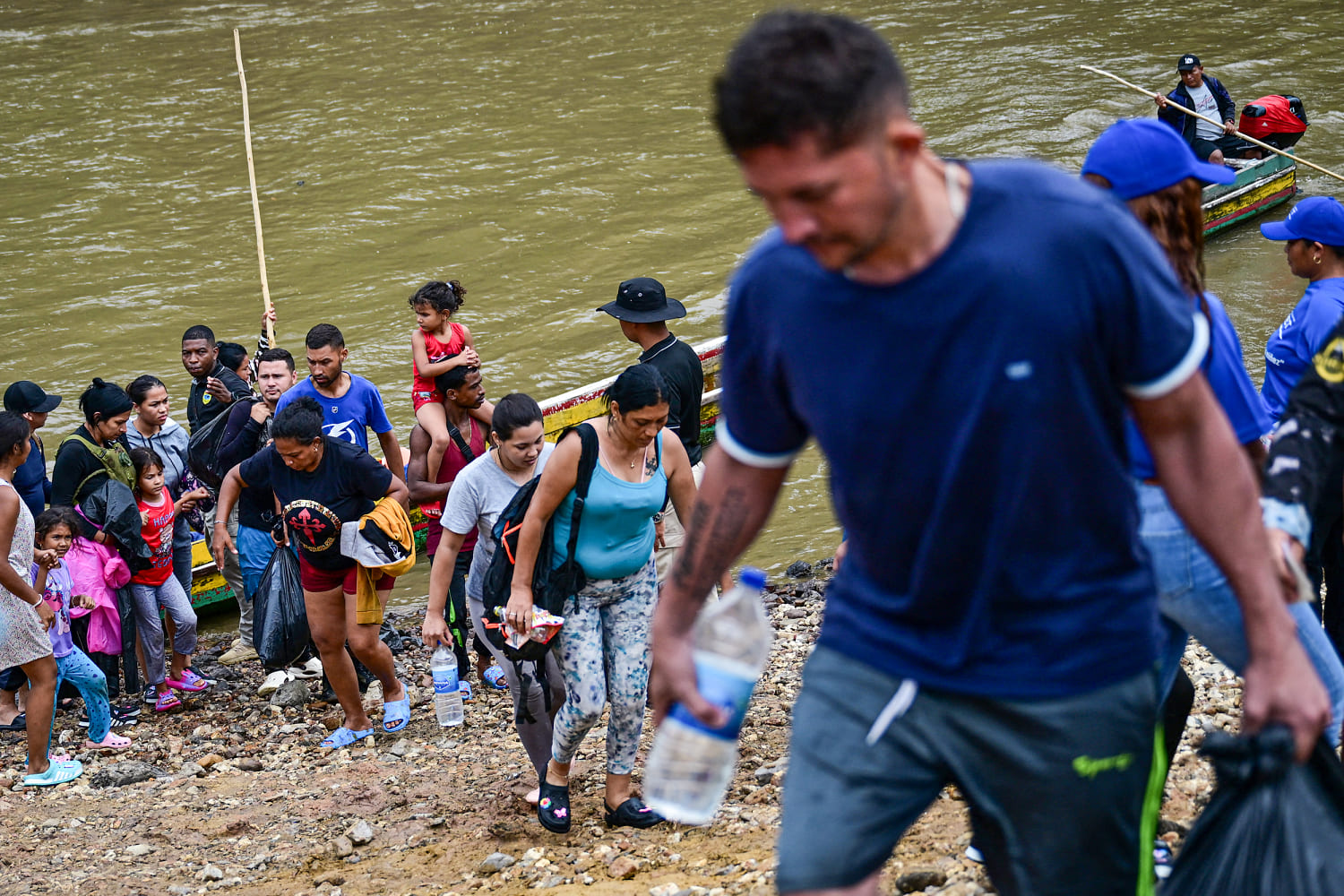The nexus of organized crime and foreign meddling threatens Latin America

Latin America has become a site of global competition. The United States must realign its focus on the region to promote economic prosperity and defeat corruption and organized crime, which will lead to reduced migration and violence and to a better quality of life for the Western hemisphere.
But achieving these goals requires facing new challenges related to evolving criminal organizations. While most of the Latin American insurgencies of old have transformed into political parties, demobilized or disappeared altogether, the remaining ones have become powerful criminal organizations, using the banner of foregone communist ideologies to bring legitimacy to their expanding criminal empires.
In addition to new criminal organizations and cartels, these groups now prioritize profits from their illegal economies and rely on corruption to achieve their goals. Today, several democratic governments in the region have found themselves tainted by allegations of illegal campaign financing and ties to transnational crime. These allegations put the legitimacy of Latin American states at risk, show a blatant lack of transparency in electoral processes and make the region vulnerable to foreign meddling.
In recent years, Latin America has seen an expansion of criminal organizations. Today, Mexican cartels have 175,000 members and are active in all 31 Mexican states. The cartels are involved in drug and migrant trafficking, extortion, prostitution, oil theft and the weapons trade, and have escalated violence against both civilians and government authorities.
Colombian armed groups have expanded significantly since the 2016 peace deal, and now operate in 24 of the 32 Colombian departments. Together, the ELN, FARC Dissidents and the Clan del Golfo have 11 percent more members than in 2022. They take part in drug trafficking, illegal gold mining, migrant trafficking and extortion. Likewise, Venezuela has become a safe haven for armed groups, and Ecuador is the preferred hub for illegal drugs to exit the continent. The Southern Cone (Argentina, Chile and Uruguay) is also not without its issues.
Organized crime no longer seeks to overthrow governments; it is now driven primarily by the pursuit of profits from illegal activities. This shift has led to a change in strategy and tactics: rather than seeking regime change, they focus on avoiding attention and maintaining control over the territories where they operate. To achieve this, criminal organizations leverage their substantial resources to corrupt and manipulate governments — securing protection from law enforcement at lower levels and influencing policy through political campaigns financed with illegal funds at higher levels.
This strategy has been successful, and many governments in the region have been tainted by allegations of corruption and illegal campaign financing.
In Mexico, former president Andrés Manuel López Obrador, and his policy of “abrazos no balazos” (“hugs, not bullets”) allowed the territorial expansion of the cartels and the fentanyl business to thrive. His successor, President Claudia Sheinbaum, announced that “the war on el narco will not return,” despite increasing violence against civilians.
In Honduras, President Xiomara Castro faces scrutiny following new evidence that her brother met with powerful drug traffickers in 2013 to finance her first attempt at the presidency. In Venezuela, ties between Nicolás Maduro’s regime and local and transnational criminal organizations have become clear in recent years. In Colombia, President Gustavo Petro has been accused of receiving illegal campaign financing through his son, who participated in money laundering and illicit enrichment from collaboration with drug traffickers and other illegal actors.
Close ties between elected officials and criminal organizations have created unprecedented tensions among government branches, paralyzing the proper functioning of checks and balances and threatening the integrity of democracy itself.
Latin America is also increasingly important on the global geopolitical chessboard. The influence of foreign powers in the region is not new. Many governments were once armed groups that turned into political parties that eventually rose to power. Given their origins as armed insurgencies, they maintain close ties to China and Russia. But the growing power of organized crime and its destabilizing effects on Latin American democracies present new vulnerabilities for foreign powers to exploit.
Anti-Western powers overlook allegations of government collusion with organized crime, and even benefit from it. A few examples include a new wave of signatories to China’s Belt and Road initiative, growing Chinese infrastructure investments in the region and China importing significant quantities of Venezuelan oil before and after the oil embargo.
Russia has not only benefited from left-wing governments in the region, but directly intervened to keep corrupt regimes in power. For several years, Russia has supplied military aid to Venezuela and deployed troops under the pretext of sharing military expertise. Wagner Group operatives were spotted suppressing crowds protesting against the fraudulent results of the 2024 Venezuelan elections.
Likewise, proxies of belligerent nations have been found to conduct illicit activities in Latin America. Hezbollah, an Iranian proxy, operates a network of drug trafficking, counterfeiting and smuggling to fund its operations in the Middle East. Chinese trading companies are used for money laundering and exporting illicit goods, such as chemical precursors for illegal drugs, while trading companies turn a blind eye to contraband. Chinese criminal groups are also major players in regional money laundering schemes. While direct ties between foreign governments and regional criminal organizations remain unproven, evidence suggests that these powers have participated indirectly in regional organized crime.
In an era of geopolitical competition, a growing disenchantment with democracy will make Latin America vulnerable to the influence of foreign powers and their strategies to destabilize the region.
To address these issues, the incoming Trump administration must refocus its attention on Latin America. The nominations of Sen. Marco Rubio as secretary of State and Ambassador Chris Landau as his deputy is a promising start that signals a commitment to strengthening U.S. engagement in the region.
Still, further steps must be taken by the U.S. to decisively safeguard its interests and promote freedom and democracy. This entails confronting corrupt governments or those that have ties to criminal groups —and being pragmatic with political realities while also denying two-faced agendas that will play against the peoples of Latin America, regional political stability, security, economic prosperity and U.S. hemispheric interests.
Juan Carlos Pinzón is a former minister of Defense of Colombia and twice served as Colombia's ambassador to the U.S. He is a visiting professor at SPIA-Princeton University. Gerardo Caneva is his chief of staff and an expert in political risk analysis.
-

4 Ways to Drive Organic Business Growth
As companies find funding harder to come by, more are turning toward organic growth strategies. Here’s what they look like.Inc. - 14h -

Only US leadership can stop China’s economic power in Latin America
The only way to stop China’s accelerated advance in Latin America continues to be democracy and the counterweight of greater leadership from Europe and the U.S.The Hill - 12h -

An English Soccer Giant Is Being Targeted by Organized Crime. Now It’s Fighting Back.
Liverpool has been under siege from gangs trying to illegally sell seats for matches.The New York Times - 1d -

Over 300,000 migrants crossed Latin America’s Darien Gap in 2024, down 42%
Over 300,000 migrants crossed the Darien Gap into Panama in 2024, 42% fewer than the record number who made the perilous jungle crossing from South America a year earlier, Panama’s migration ...NBC News - 1d -
Slovakia threatens to cut benefit for Ukrainians
Yahoo News - 2d -

Slovakia threatens to cut benefit for Ukrainians
A dispute between Slovakia and Ukraine over Russian natural gas transit has been escalating.BBC News - 2d -
Why it’s hard to be a friend of America
Nippon Steel’s bid for US Steel shows the flaws in the ‘friendshoring’ approachFinancial Times - 2d -

America’s gathering legal storm
Donald Trump promises the mother of all stress tests for the US rule of lawFinancial Times - 3d -

Trump tariffs threaten pharmaceuticals
Welcome to The Hill's Business & Economy newsletter {beacon} Business & Economy Business & Economy The Big Story Trump tariffs could upend pharma supply chain The hefty tariffs President-elect ...The Hill - 4d
More from The Hill
-

New York Republican suggests hush money case helped to elect Trump: ‘Great irony’
Rep. Mike Lawler (R-N.Y.) suggested the New York hush money case played a part in helping President-elect Trump win the 2024 presidential election against Vice President Harris. “Well, the great ...The Hill - 1h -

Kinzinger on 'changed' GOP: 'I'm probably closer to a Democrat now'
Former Rep. Adam Kinzinger (R-Ill.) reflected on the “changed” Republican Party, saying he finds himself being “probably closer to a Democrat now” politically, arguing the Democratic Party is ...The Hill - 2h -

Trump flexes power over House GOP in whirlwind Speaker race
President-elect Trump reasserted his power over the House GOP conference during Friday’s whirlwind Speaker vote, proving that, despite some recent doubts, he still has significant sway over ...The Hill - 3h -

German chancellor on Musk: ‘Don’t feed the troll’
German Chancellor Olaf Scholz shared his approach to dealing with tech mogul Elon Musk who lately has traded barbs with German politicians, saying it is wise to not “feed the troll.” “There are a ...The Hill - 4h -

Democrats look for places to work with Trump 2.0
Democrats say one thing is certain: 2025 won't be 2017, when it comes to the start of the Trump administration. Two months after their grueling and disappointing White House loss to ...The Hill - 4h
More in Politics
-
Biden awards Presidential Medal of Freedom to Hillary Clinton, 18 others
The nation's highest civilian honor will be presented to 19 people at the White House later Saturday.CBS News - 12m -
Carter honored in Atlanta: "It's amazing what you can cram into 100 years."
Former President Jimmy Carter died on Dec. 29 at the age of 100.CBS News - 1h -

New York Republican suggests hush money case helped to elect Trump: ‘Great irony’
Rep. Mike Lawler (R-N.Y.) suggested the New York hush money case played a part in helping President-elect Trump win the 2024 presidential election against Vice President Harris. “Well, the great ...The Hill - 1h -

Kinzinger on 'changed' GOP: 'I'm probably closer to a Democrat now'
Former Rep. Adam Kinzinger (R-Ill.) reflected on the “changed” Republican Party, saying he finds himself being “probably closer to a Democrat now” politically, arguing the Democratic Party is ...The Hill - 2h -

Trump flexes power over House GOP in whirlwind Speaker race
President-elect Trump reasserted his power over the House GOP conference during Friday’s whirlwind Speaker vote, proving that, despite some recent doubts, he still has significant sway over ...The Hill - 3h
